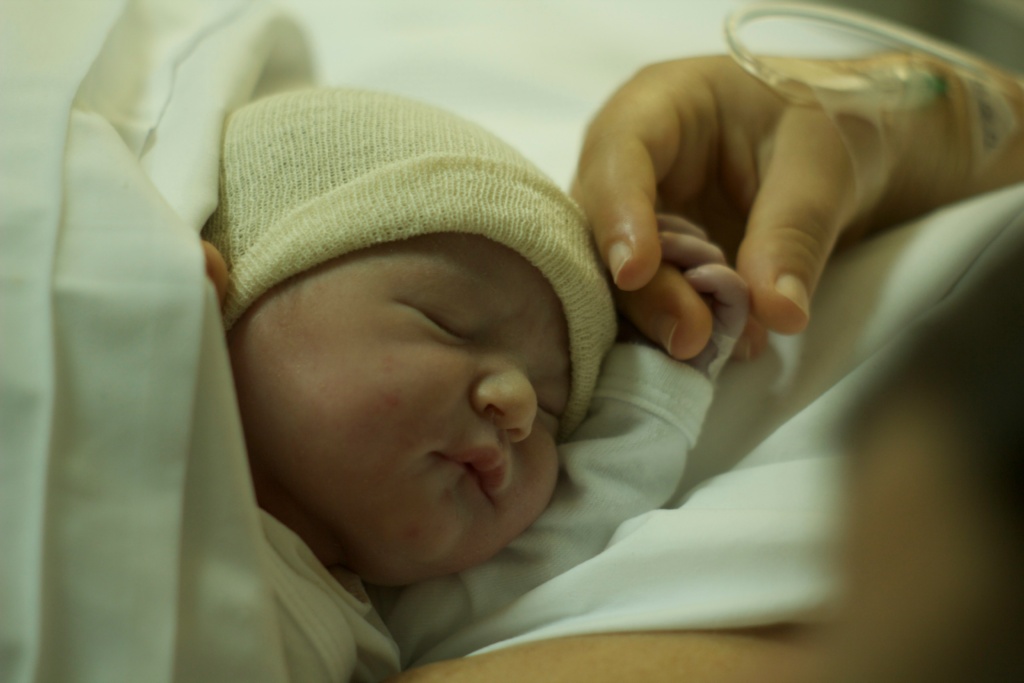Birth Trauma: What Is It, and What Impact Can It Have?

Childbirth is one of the greatest gifts a human can experience. It can be amazing, beautiful, empowering, emotional, and life-changing! The true, remarkable strength of a woman shines through as a seemingly impossible task becomes real and tangible. And as the family grows, hearts explode with love and pride in awe of the miracle that has just occurred.
The birth of a baby can have a profound and positive impact on a mother and family for so many reasons. Despite all of the joyful and breathtaking moments, however, it is important to recognize that all stages of childbirth can also be traumatic for mamas, both physically and emotionally. In fact, even a BEAUTIFUL birth with lots to be grateful for, can also include birth trauma.
What is Birth Trauma?
According to the Birth Trauma Association, “birth trauma” is a shorthand term to describe symptoms of distress you might experience after having gone through, or witnessed, a traumatic birth. In some cases, these symptoms can be enough for a diagnosis of post-traumatic stress disorder (PTSD).” The Birth Trauma Association reports research that indicates over ONE THIRD of women consider their birth experience to be a traumatic one. Further, 4-5% of women struggle with PTSD after giving birth, and 1% of birthing partners develop PTSD after birth. With close to 4 million women giving birth in the United States each year, that results in a staggering number of individuals experiencing birth-related trauma.
Although it’s referred to as “birth trauma,” the label truly starts at the point of trying to conceive and includes the duration of the pregnancy, the birth, as well as postpartum. When it comes to this type of trauma, it’s easy to first think of large-scale issues such as extended difficulty conceiving, long/complicated/painful pregnancies and labors, medical interventions and/or emergencies, premature births, or stillbirths. The truth is that trauma can also be present in short labors and with labors that could be described as “easy.” For many women, the feeling of a loss of control, helplessness, or not being properly heard and seen by healthcare professionals can also be traumatizing. Particularly with pregnancies and during births associated with hospital settings, there is not always informed consent nor much control provided to or given to mothers. Any or all of these factors can result in a mother experiencing signs or symptoms of birth trauma.

Birth Trauma Symptoms
It is important to recognize that trauma, related to birth or otherwise, is a subjective experience that centers on how an individual believes his/her life, bodily integrity, or psychological well-being is threatened. In other words, if while trying to conceive, while pregnant, during childbirth, or postpartum, a mother felt that she, her body, or her baby were in danger, there is likely to be resulting trauma. The result can leave mothers with intense symptoms, thoughts, and emotions which impact their daily functioning.
The symptoms of birth trauma can vary from person to person and range from mild to debilitating. The following is a list of some of the characteristic symptoms of birth trauma (this is not an exhaustive list):
- Distressing feelings (grief, terror, anger) towards pregnancy, birth, or postpartum
- Intrusive thoughts, memories, persistent flashbacks and/or nightmares of the traumatic events
- Easily triggered into a distressed state (symptoms of this state can include racing heart, sweating, nausea, feeling faint, shortness of breath, anxiety or panic)
- Emotional numbness
- Difficulty bonding with baby and others
- Self-isolation
- Avoidance of people, places, or situations that remind you of the birth
- Insomnia
- Irritability or unexplainable anger
- Depression and decreased motivation or interest in activities
- Feeling sad or crying for no apparent reason; absence of joy
- Hypervigilance / constantly alert and jumpy
- Obsessively talking about the traumatic event(s) or avoiding any conversation about it
- Blaming yourself or someone else for what happened
Because of hormonal fluctuations that naturally occur during and after pregnancy and childbirth and the adrenaline needed to birth a baby, there may be some overlap between common “postpartum symptoms” and those related to postpartum depression (“PPD”), postpartum anxiety, and birth trauma. For instance, it is common for new mothers to feel depleted, exhausted, emotional, and like there is no time for herself – these common feelings are often described as having the “baby blues.” For differentiation purposes, it is wise to specifically monitor the onset and duration of the feelings/emotions as well as the severity of the symptoms.
The Impacts of Birth Trauma
Being a first time (or second time, third time, etc.) parent is a beautiful but challenging time even when births go as planned and without issue. When birth trauma exists, however, it can make this challenging time even more difficult. Experiencing the symptoms described above can impact a mother’s mental and physical well-being, her ability to function, her ability to parent, as well as her bonding experiences with her babies and families.

What Can You Do If You Think You Have Birth Trauma?
Once a baby arrives, the mom’s focus must primarily shift to her new baby. This generally includes frequent wakeups, feedings, diaper changes, and so much more. Because of the baby’s helplessness and vulnerability, mom’s needs are often pushed to the back burner. While babies very much warrant and deserve to be a priority, we must not forget to also prioritize mama’s health and well-being. This is where we’ve got to consider and recognize birth trauma so that it can be supported and treated.
Hear this: Trauma is Trauma. Some mamas may not identify their symptoms or experiences as being traumatic or feel as though they are “allowed” to call it trauma. If a mother has experienced distress before, during, or after her baby’s birth, the first step is to acknowledge her right to call it trauma. There is no scale, no comparison, and no hierarchy for trauma. It’s about the perception of what has happened and how the person moves through it (or not). Mothers must understand that they are not alone, nor are they weak for acknowledging their trauma. In fact, seeking support in this very difficult time will help them to heal so that they can be the individuals and mothers they are meant to be.
Support Is Possible
If you feel you may be struggling with birth trauma, please let your OBGYN or midwife know right away. With proper support, mamas can absolutely heal and reconnect with themselves and their babies after experiencing birth trauma. If you are seeking more information about the ways you or a loved one can overcome birth trauma, stay tuned for my next blog where I will be discussing a variety of resources that are available for mothers during this difficult time. If you are seeking postpartum mom/baby support, check out our pregnancy support package.
